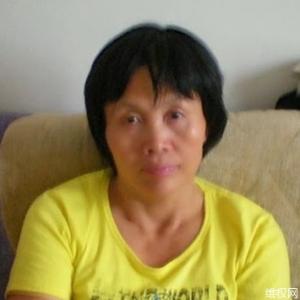Human rights defender Cao Shunli (曹顺利) died today in Beijing. Cao, who had been in police custody since September 2013 and suffering from various medical conditions, was admitted to intensive care at the Beijing Qinghe 999 Hospital last month, and later transferred to the 309 Military Hospital.
Cao’s brother Cao Yunli (曹云立) told HRIC that he received a call from a Dr. Su at the 309 Military Hospital at 3:00 p.m., and when he arrived at the intensive care unit at around 4:00 p.m., Cao had already passed away.
“I took one look and couldn’t look again,” said a grief-stricken Cao Yunli. “What heinous crimes did she commit to have been tormented this way?”
Cao’s lawyer Wang Yu (王宇) told HRIC that the hospital initially refused to allow her and family members to view Cao's body, but later allowed only the family to do so. Wang also said that a number of Cao's supporters were taken away by the police while attempting to enter the hospital this afternoon. Rights activist Liu Xiaofang (刘晓芳), who was close to Cao, has not been heard from in days, and calls to her mobile phone went unanswered. Liu told HRIC last month that a doctor at the 309 Military Hospital said Cao was already in extremely critical condition when she was transferred there on February 20.
Cao went into detention in ill health, and told her lawyer in October that she was not receiving medical treatment. Cao’s lawyer made several requests for medical parole. The authorities did not respond to those requests. But on February 20, the day the family was informed of Cao’s critical condition, an official from the Chaoyang District Detention Center, where Cao was held until she was hospitalized, asked Cao’s family to apply for medical parole, which the authorities approved one week later.
On March 5, Wang and another lawyer, Liu Weiguo (刘卫国), filed eight separate Open Government Information requests pressing the Chaoyang District Detention Center to disclose information concerning its handling of Cao's medical condition throughout her detention.
Cao's death came just five days before the United Nations Human Rights Council is scheduled to consider the report of China's second human rights review under the Universal Periodic Review (UPR) mechanism, to which Cao submitted a civil society report detailing the plight of petitioners in China. China received 252 human rights recommendations from other countries at the UPR and accepted 204, including a recommendation to “[f]acilitate the development,..of a safe and enabling environment in which both civil society and human rights defenders can operate free from fear, hindrance and insecurity.”
“At this tragic time, we send Cao Shunli’s family our deepest sympathy and condolences for their loss. Cao’s death is also a great loss to the entire community of rights defenders in China,” said Sharon Hom, HRIC Executive Director.
A representative of the growing citizen legal activism in China, Cao Shunli has in recent years been using Chinese laws and the courts to press the government for greater transparency and to permit citizen participation in its international reporting on the country’s human rights progress. Beginning in June 2013, Cao also participated in sit-ins in front of the Ministry of Foreign Affairs to petition for participation in the reporting process of the UPR. The authorities systematically rejected these requests. (Click here to see Cao Shunli’s case documents)
Cao was disappeared from the Beijing Airport on September 14, 2013, en route to Geneva to attend a training session for NGOs on United Nations human rights mechanisms. Cao was formally arrested in October on suspicion of “picking quarrels and provoking troubles” (寻衅滋事) and had been held in the Chaoyang Detention Center in Beijing.
HRIC calls upon the authorities to immediately launch a thorough independent investigation into the circumstances around Cao Shunli’s illness in detention and her death, including the medical treatment afforded her, and to make public the findings. HRIC also calls upon the authorities to respond to the OGI requests submitted by Cao’s supporters.
